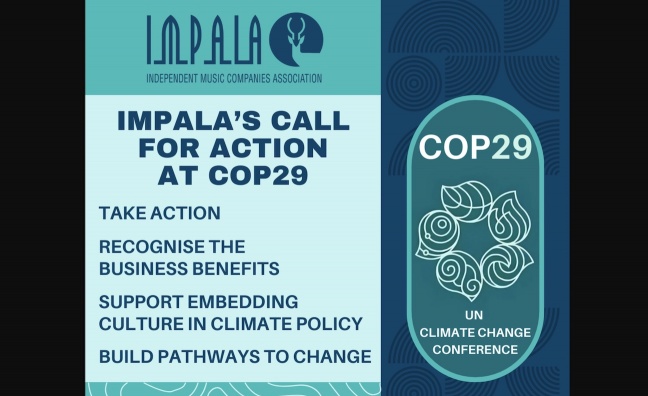With COP29 drawing to a close, IMPALA has encouraged members to assess their environmental impact.
The trade body is urging European indies to recognise the associated business benefits, as outlined in the Business Case for Sustainability released earlier this year, and support initiatives such as the Global Call to Action to Put Culture At the Heart of Climate Policy.
IMPALA said that members who want to take concrete action can follow these steps:
1) Measure their carbon footprint annually with the IMPALA Carbon Calculator, developed in partnership with Julie's Bicycle and supported by Merlin and Murmur
2) Reduce greenhouse gas emissions from business operations and suppliers
3) Allocate funds for climate investment /environmental projects to take responsibility for unavoidable emissions, for example to Murmur
4) Repeat the process
Karla Rogozar, IMPALA’s sustainability lead, said: “To fully utilise this transformative power of the creative sector, it is important to act on multiple levels at the same time, both at small and big scale. We encourage our members to take advantage of the freely available tools at their disposal, to help them advance on their journey and take concrete steps to implement sustainability as a core element of their business.”
IMPALA noted that this approach not only benefits the environment but also enhances business operations. As outlined in the Business Case for Sustainability: “Investigating and transitioning to more efficient business practices, and opting for more sustainable production and distribution methods, leads to lower costs over time while reducing waste, as well as a more creative and forward-thinking culture.”
Music and culture have a great influence in shaping public attitudes and narratives
Karla Rogozar
IMPALA also supports the Global Call to Action which advocates for culture to take its rightful place in climate discourse. As part of this, IMPALA supports the inclusion of a cultural workshop request in the final decisions of COP29. This workshop would serve as a step toward the inclusion of culture at COP30 in Brazil and could catalyse the tabling and adoption of a ‘Joint Work Decision.’
Alison Tickell, advisor to IMPALA’s Sustainability Task Force and Julie’s Bicycle founder and co-director, said: “Together, we must apply relentless pressure to fulfil the promise of the Paris Agreement. To achieve the necessary policy shifts, we must activate all possible pressure points. This is critical. Through the Global Call to Action to Put Culture At the Heart of Climate Policy, we advocate for culture to take its rightful place on the climate agenda. It is time to elevate and bring together the voices of artists, creatives, and cultural custodians. Their work is not merely reflective of the world we live in, it is a force for transformation.”
Industry-led collaborations that merge culture and climate in the music sector are also recognised by IMPALA, such as:
Music Declares Emergency
Earth Percent
Murmur
Music Climate Pact
Karla Rogozar added: “Music and culture have a great influence in shaping public attitudes and narratives. By leveraging this power, the cultural sector can lead the way in addressing climate challenges and inspiring transformative change. This will help amplify the potential to make sustainability a defining feature of our industry and vice versa.”












